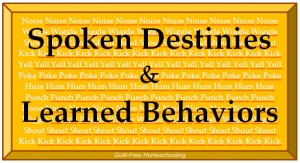The “last straw” that finally convinced us to begin homeschooling was hearing homeschool advocate Gregg Harris on a local talk-radio program. He was promoting an upcoming seminar (which my husband and I quickly made arrangements to attend) and was giving myriad reasons why a growing number of families were choosing to educate their children at home.
The seemingly trivial reasons that actually caught my attention dealt with the hassles caused by public school’s time schedules. We had found that public school activities and programs frequently kept our children up past their bedtimes, causing them to be difficult to start off again the next morning. Mr. Harris touched on the rush to get up, get dressed, eat breakfast, and get to school on time — a continual struggle at our house. He light-heartedly mentioned that homeschooling removes all those rush-rush problems: if you find yourselves up too late at night, sleep in a little the next day, and then begin school on your own timetable. School lunches would no longer be offensive to picky eaters: Mom’s cooking would always be readily available. Homework would also disappear as an after-school trauma: enough time could be allotted during each subject to do all the work necessary for the day’s lesson. I found myself much more interested in homeschooling after hearing just a few of these statements by Mr. Harris, reasons that I had not personally considered before.
For many years we had known families who homeschooled. We met the first ones when our daughter was a year old. We currently had several families in our church who homeschooled, making no lack of people to turn to for support and encouragement. I had never considered homeschooling as an option for us until this point, when, suddenly, homeschooling looked like the solution to many of the problems plaguing our household.
The primary reasons for homeschooling that we gave to family and friends were health-related. They all knew that our daughter had been plagued by tremendous headaches for several years and sympathized with our need to make a drastic lifestyle change for her sake. She often could not endure an entire day at school: once her headache became intense, the noise of the classroom was intolerable and she needed to come home for relief. She was always able to do some subjects without difficulty, but others critically depended on her ability to concentrate. We had been to doctor after doctor, endured all sorts of tests, tried a variety of medicines (to no avail), and fought ten rounds with the schools over attendance policies (even though her grades never lagged). We even changed from one public school to another in an attempt to find an administration that would listen to us and help us cope. When the school nurse declared that a child who did not run a temperature or vomit was not actually “sick,” we knew we had finally reached the end of that rope. Something drastic had to happen. Homeschooling provided an ideal solution: our daughter could do schoolwork during the hours when she felt well, and she could lie down to rest when she felt ill without conflicting with anyone. She could do the easy subjects any day and save the harder subjects for the days when her head could tolerate intense concentration. (Along with our adaptation to homeschooling came a change in diet, prompted by much research into the various probable causes of headaches, resulting in success in controlling her headaches and other related symptoms.)
As our first year of homeschooling passed and we began our second year, we became more enthusiastic about learning at home. We were shaking off most of the public school trappings of schedules and preconceived ideas of what certain academic subjects should resemble. We were becoming independent in our homeschooling. We attended field trips, play days, and family potlucks with other homeschoolers. We took days off to have spontaneous family days with Dad. We drew closer as a family unit; we enjoyed each other’s company. We began to see other, deeper reasons for homeschooling.
I had read about people who said they homeschooled for “religious reasons.” I was not sure I understood that at the time, thinking they must be much more radical in their faith than I was, but now I was beginning to see their point of view. Public school had a very anti-family overtone to it that was not voiced aloud, just understood: they were the professional educators; we could not possibly pass anything of importance on to our children. Personal Christian values were pushed aside at public school, even by teachers who were themselves faithful, believing Christians. By homeschooling, we could make our beliefs the most important aspect anytime, all the time, if we wanted. We could ignore the witches and hobgoblins of Halloween. We could be truly thankful for God’s blessings at Thanksgiving. We could take time to celebrate “Christmas,” and not “Winter Break.” We could sing songs with their original words and not the carefully rewritten, politically correct lyrics we were so often forced to endure in public school programs.
Although we had begun homeschooling for the reasons of caring for our daughter’s health and adapting family-friendly scheduling, we soon began to realize that our Christian faith played a dramatic part in our reasons to continue homeschooling. We thoroughly enjoyed being able to concentrate on creation science and point out the difficulties with evolutionary theories. We could count Christian fiction as literature, not just as pleasure reading material only to be indulged in during one’s private hours. We designated a large block of time each day to Mom reading aloud from Christian books — a huge children’s book of Bible stories, the Chronicles of Narnia series, the Little House series, Frank Peretti’s Cooper Kids series, and many others. We discussed our faith, what made it important to us, and how we saw it being strengthened through homeschooling. We could tie in scripture to any subject where we saw an application, without fearing that we might offend another student or violate an administrative policy. We sadly watched public school friends become increasingly influenced by peer pressure in all areas of their lives, including Christians who made choices contrary to their faith.
We made the decision to homeschool based on one set of reasons, primarily health related. We continued our decision to homeschool based on another set of reasons, primarily the freedom to practice our chosen religion in every facet of our lives.




 Guilt-Free Homeschooling is the creation of Carolyn Morrison and her daughter, Jennifer Leonhard. After serious disappointments with public school, Carolyn spent the next 11 years homeschooling her two children, from elementary to high school graduation and college admission. Refusing to force new homeschooling families to re-invent the wheel, Carolyn and Jennifer now share their encouragement, support, tips, and tricks, filling their blog with "all the answers we were looking for as a new-to-homeschooling family" and making this website a valuable resource for parents, not just a daily journal. Guilt-Free Homeschooling -- Equipping Parents for Homeschooling Success!
Guilt-Free Homeschooling is the creation of Carolyn Morrison and her daughter, Jennifer Leonhard. After serious disappointments with public school, Carolyn spent the next 11 years homeschooling her two children, from elementary to high school graduation and college admission. Refusing to force new homeschooling families to re-invent the wheel, Carolyn and Jennifer now share their encouragement, support, tips, and tricks, filling their blog with "all the answers we were looking for as a new-to-homeschooling family" and making this website a valuable resource for parents, not just a daily journal. Guilt-Free Homeschooling -- Equipping Parents for Homeschooling Success!

Recent Comments